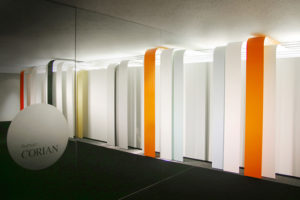Corian is the brand name of DuPont’s very popular solid surface countertop line. It was first introduced in 1971 and marketed as a ‘space age material. Until DuPont’s patent ran out, it was the first and only solid surface counter on the market. To this day, the name is still used interchangeably with the phrase ‘solid surface’, despite the fact that several brands make products that are as good or even better.
The composition consists of 33% binding resins and 66% minerals. Its composition makes it non-porous, so it’s stain resistant. It’s also heat resistant up to around 212 degrees F, but the manufacturer recommends the use of a trivet under hot pans to prevent warping . Color pigments are added to the resin to give them their final coloring.

Because it’s flexible when it’s heated, it can be bent and shaped in almost limitless ways. It can be used for almost anything, but its primary use is still in kitchen work surfaces. It can also appear seamless when installed since the epoxy used to glue the pieces together can be blended to match. Once the pieces are epoxied and joined, the dried seam can be sanded into invisibility, leaving a smooth, unblemished finish.
In a nutshell, Corian countertops are the man-made material that doesn’t look man-made, is more durable than the cheaper materials, and that is often more affordable than stone.